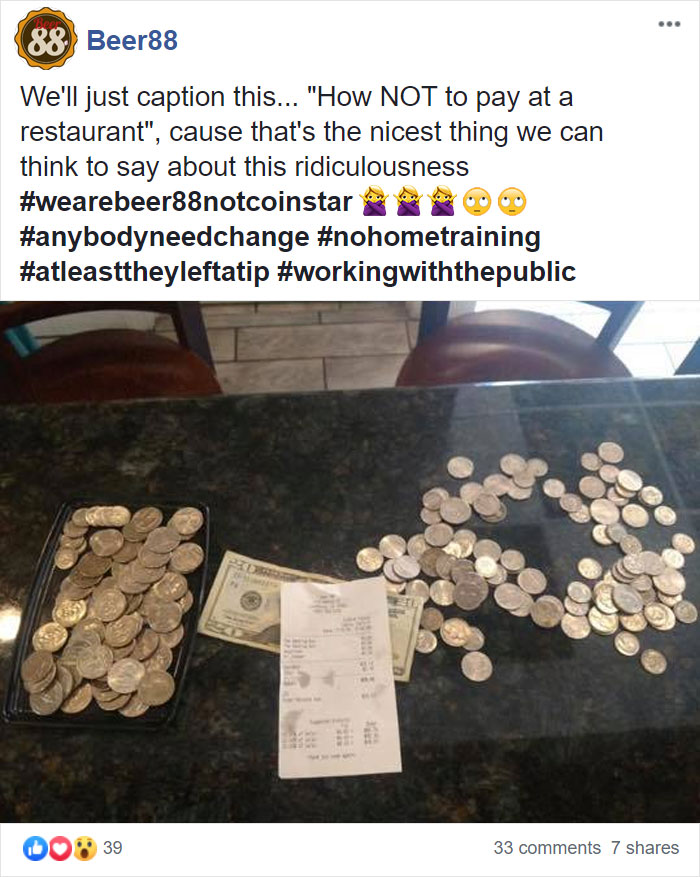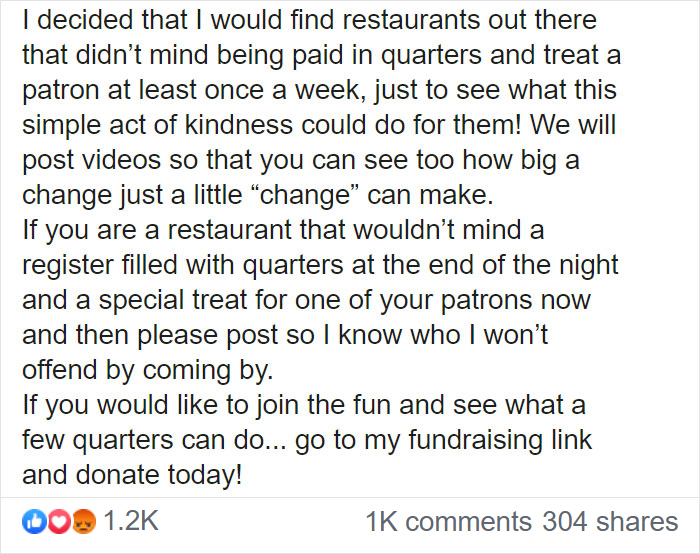
We’ve all been in situations where we want to (or need to) use all the loose change that has accumulated in our lives.
We might have found an unexpected cache of coins behind the couch because we were out of money and needed to do some grocery shopping. Or we (finally) broke the pink piggy bank that we’ve had since our fifth Christmas. The point is, we have a bucket-load of coins that need to be spent, but doing that can sometimes be embarrassing. Money is money, right? Wrong. Some people can’t stand customers using coins to pay. How dare they?! The audacity! Using the money to pay for goods and services?! Unbelievable! When he was 17 years old, Cohen Naulty from Lynchburg, Virginia, paid for his and his friends’ meals at a restaurant with quarters and was shamed for it online.
We might have found an unexpected cache of coins behind the couch because we were out of money and needed to do some grocery shopping. Or we (finally) broke the pink piggy bank that we’ve had since our fifth Christmas. The point is, we have a bucket-load of coins that need to be spent, but doing that can sometimes be embarrassing. Money is money, right? Wrong. Some people can’t stand customers using coins to pay. How dare they?! The audacity! Using the money to pay for goods and services?! Unbelievable! When he was 17 years old, Cohen Naulty from Lynchburg, Virginia, paid for his and his friends’ meals at a restaurant with quarters and was shamed for it online.

Cohen reacted in the best way possible: he started a charity campaign to treat strangers with food at restaurants that don’t mind taking quarters. The ironic cherry on top? Cohen was paying with coins because he works as a waiter at another restaurant and gets lots of quarters as tips. Thus the legend of Quarter Boy was born! Cohen’s story went viral and the restaurant ‘Beer 88’ that shamed him got a rude awakening: people criticized the pub for its policy and suggested that people punish it by also paying with coins. The restaurant responded by saying the whole situation was just a joke and wasn’t meant to shame anyone, then removed the statement. In response to receiving threats, the restaurant owner Yao Liu officially apologized for what happened.


As for the fundraiser that Cohen started up, it received a lot of attention and donations from the public. Cohen still pays for strangers’ meals to this day. Godspeed, Quarter Boy. We attach symbolic value to paper bills and metal coins to make society function. However, some coins are intrinsically more valuable than others. For example, United States quarters have cores of pure copper and are clad with a mix of 75 per cent copper and 25 per cent nickel (there’s a joke about ‘quarters’ and ‘nickels’ here somewhere, I’m sure of it). These metals aren’t as valuable as, say, gold. But why is gold more valuable than other metals and elements? there is a logic as to why we use specific chemical elements as money because they are valuable in and of themselves. We can’t really use gases or liquids as currency. Imagine what a pain it would be to transport money that way. Paying for a carton of milk with a bottle of mercury? Buying an apple with a balloon full of helium? No thanks!. That leaves us with metals like iron, copper, lead, silver, gold, palladium, platinum, and aluminium. But not all of them are equal. For example, iron, copper, and lead corrode over time. We don’t want our coins to lose value quickly now, do we? Nor do we want to constantly polish and maintain hundreds of coins. What are we? Dragons? .Noble metals’ like platinum or palladium would be ideal for forging coins because of how non-reactive (non-corrosive) they are. The downside? They’re too rare. What we need are metals that are rare but available enough to make commerce viable. Enter gold and silver. And gold is as close to perfect as we can get. Gold is rare but not too rare, doesn’t corrode, is easy to smelt and work with, and is beautiful in an intense way.

Sam Dogen, the founder of Financial Samurai, talked about precious metals, the gold standard, as well as why some people dislike individuals who pay for goods and services with coins.“Metals such as silver and gold are called ‘precious metals’ because they don’t corrode, they provide a sustainable store of value, and humans are physically attracted to their colour and feel. Gold and silver are abundant enough to create coins, but rare enough where not everyone can have them, or a whole lot of them.“Economics and societies have placed value on these precious metals, and have thereby continued to perpetuate its worth. When currencies get devalued, precious metals tend to rise in value, which gives them even more value due to their insurance properties and stability,” Dogen explained succinctly. He went on to reveal why we ended up letting go of the gold standard: “Countries started abandoning the gold standard because gold could not grow in supply as quickly as paper money and coins to help stimulate the economy. There were deflation and high unemployment in the early 1930s. As a result, President FDR abandoned the gold standard in 1933, which allowed the government to print more money, stop deflation, and stimulate the economy. Simply put, abandoning the gold standard provides more monetary policy flexibility.”In Dogen’s opinion, some individuals dislike customers who pain with coins because they are “impatient and too judgmental for their own good.”“Loose change is seen as inconvenient, heavy, and perhaps even dirty. If you’re not spending money using a credit card, you’re perceived as inefficient and behind the times. I personally put everything on a rewards credit card for the points, cashback, convenience, and purchase protection.”